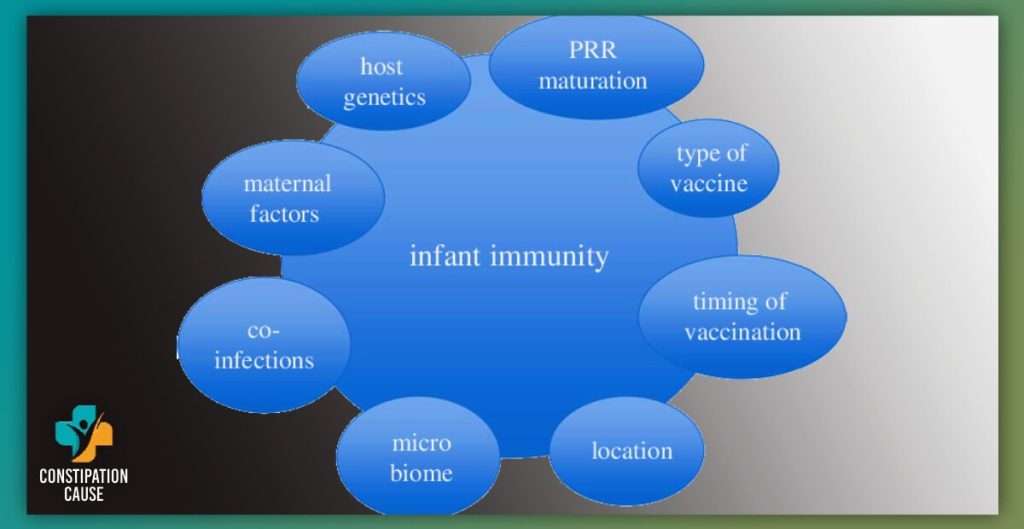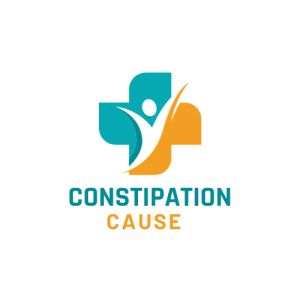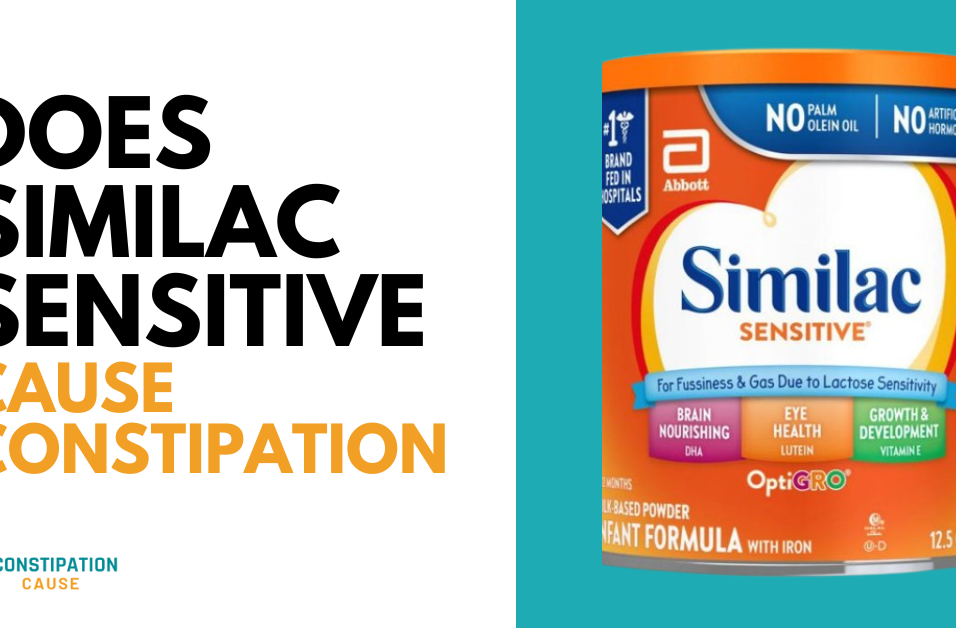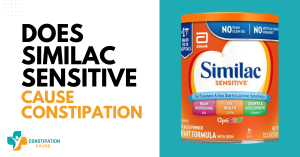Mylicon, a brand name for simethicone, is a medication commonly used to alleviate gas-related discomfort in newborns and infants. It works by reducing the surface tension of gas bubbles in the stomach and intestines, making it easier for babies to pass gas. This can help relieve the discomfort, bloating, and fussiness often associated with colic or gas buildup in young infants.
Parents and caregivers frequently turn to Mylicon as a solution for these digestive issues, as it is generally considered safe and effective for infants. However, there is a concern among some parents and healthcare providers about the potential link between Mylicon and constipation in infants
Therefore, in this article we will discuss in detail, “Can Mylicon cause constipation in newborns?”
So, let’s get started!
Mylicon and Its Composition:
Active Ingredient in Mylicon: Simethicone
Mylicon is a medication commonly used for relieving gas in newborns and infants, with its primary active ingredient being simethicone. Simethicone belongs to a group of medications known as antifoaming agents. It is essentially a silicone-based compound that is used to alleviate discomfort caused by excess gas in the gastrointestinal tract.
How Simethicone Works:
Simethicone works by decreasing the surface tension of gas bubbles that are formed in the stomach and intestines. This action helps in combining smaller gas bubbles into larger ones, making it easier for them to be expelled from the body naturally, either through burping or passing gas. It’s important to note that simethicone does not reduce or prevent the formation of gas but rather assists in the elimination of gas that has already been formed.
This process can be particularly beneficial for newborns and infants who often struggle with gas due to their still-developing digestive systems. Since they frequently swallow air while feeding or crying, the formation of gas bubbles can cause discomfort, bloating, and fussiness, commonly referred to as colic symptoms. By helping to consolidate and expel these gas bubbles, Mylicon can provide relief from these discomforting symptoms.
Simethicone is not absorbed into the bloodstream, making it a safe option for use in infants. It simply acts within the gastrointestinal tract and is passed out of the body without undergoing any metabolic changes. This non-absorptive nature contributes to the safety profile of Mylicon, making it a go-to choice for many parents dealing with their infants’ gas-related discomfort.
Definition and Characteristics of Constipation in Newborns:
Constipation in newborns refers to a condition where an infant experiences difficulty in passing stool or has infrequent bowel movements. Unlike in adults, constipation in newborns is not only about the frequency of bowel movements but also about the consistency and effort involved in passing stool. Characteristics of constipation in newborns include:
- Hard, dry stools that may be difficult for the infant to pass.
- Noticeable discomfort or strain while trying to have a bowel movement.
- Less frequent bowel movements than usual, although frequency can vary greatly among infants.
- A bloated or hard abdomen may also be a sign of constipation.
Normal Bowel Movement Patterns in Infants:
The bowel movement patterns in infants can vary widely and are influenced by factors such as age, diet (breastfed or formula-fed), and the individual development of the digestive system. In general:
- Breastfed newborns may have more frequent bowel movements compared to formula-fed babies. They might pass stool multiple times a day, often with each feeding in the early weeks.
- Formula-fed infants typically have fewer bowel movements than breastfed infants, and their stools are usually firmer.
- After the first few weeks of life, it’s common for both breastfed and formula-fed infants to have fewer bowel movements. Some breastfed infants might even go several days without a bowel movement, which can be normal if the stools are soft and passed without difficulty.
Can Gripe Water Cause Constipation in Newborns?
The question “can Mylicon cause constipation in newborns?” has been a topic of discussion among pediatricians and researchers. To date, there have been limited studies specifically addressing this issue. However, based on the existing scientific literature and expert opinions:
- Nature of Simethicone: Simethicone, the active ingredient in Mylicon, is not absorbed into the bloodstream and works by breaking down gas bubbles in the gut. It is designed to alleviate discomfort caused by gas and does not have a direct effect on the muscles or nerves of the bowel.
- Lack of Direct Evidence: There is no substantial clinical evidence suggesting that simethicone leads to constipation. Most healthcare professionals agree that simethicone is unlikely to cause constipation due to its mode of action, which is localized in the gastrointestinal tract and does not involve altering bowel movement patterns or stool consistency.
- Expert Consensus: Pediatricians and gastroenterologists generally consider simethicone a safe option for relieving gas in infants. It is widely prescribed due to its safety profile and non-systemic nature.
Factors Influencing Individual Responses to Mylicon:

While Mylicon is generally safe, it’s important to acknowledge that individual responses to “does mylicon constipate babies?” can vary. Factors that may influence an infant’s response to Mylicon include:
- Underlying Digestive Issues: Infants with pre-existing digestive problems or sensitivities might react differently to Mylicon or any other medication.
- Age and Developmental Stage: The age and developmental stage of an infant can affect how their body responds to treatments. Newborns have immature digestive systems, which can react unpredictably.
- Dosage and Frequency of Use: As with any medication, following the recommended dosage and frequency is crucial. Overuse or incorrect dosing might lead to unintended consequences.
- Interaction with Other Medications or Foods: If an infant is taking other medications or has recently had dietary changes, these factors could influence how they respond to Mylicon.
Alternatives to Mylicon for Gas Relief:
- Gentle Belly Massage: Lightly massaging your baby’s belly in a clockwise direction can help move the gas along.
- Warm Bath: A warm bath can relax your baby’s abdominal muscles, making it easier for them to pass gas.
- Bicycle Legs Exercise: Moving your baby’s legs in a gentle, cycling motion can help release trapped gas.
- Feeding Adjustments: Experimenting with different feeding positions or techniques to reduce air intake.
- Burping More Often: Ensuring the baby is burped frequently during and after feeds to release swallowed air.
- Herbal Teas: For older infants, small amounts of herbal teas like chamomile or fennel might be helpful (consult a pediatrician first).
- Dietary Changes for Breastfeeding Mothers: Sometimes, changing the mother’s diet can affect the baby’s gas if breastfeeding.
- Gripe Water: A mixture of water and various herbs, gripe water is a traditional remedy for colic and gas.
- Probiotic Drops: Probiotics for infants can sometimes aid in digestion and reduce gas.
- Lactase Drops: For babies who have difficulty digesting lactose, lactase drops can be added to formula or expressed breast milk.
- Wind Drops: Similar to simethicone-based products like Mylicon, but may have different formulations.
Mylicon Usage Guidelines
- Proper Dosage and Administration of Mylicon for Newborns:
- Dosage: The recommended dosage of Mylicon for newborns and infants typically ranges from 0.3 ml to 0.6 ml, administered up to four times daily after meals and at bedtime. However, it’s crucial to follow the specific dosage instructions on the product label or as prescribed by a healthcare professional.
- Administration: Mylicon drops can be given directly to the infant using the dropper provided or mixed with a small amount of water, formula, or breast milk.
- Consistency: For the best results, Mylicon should be administered regularly, especially after feedings and before sleep, as these are common times for gas buildup.
- Shake Well Before Use: Always shake the bottle well before administering the drops to ensure the medication is properly mixed.
- Importance of Consulting a Pediatrician Before Usage:
- Individual Needs: Every infant is unique, and a pediatrician can provide guidance tailored to your baby’s specific health needs and conditions.
- Safety and Efficacy: A healthcare professional can confirm that Mylicon is a suitable choice for your infant, especially if they have any underlying health issues or are on other medications.
- Dosage Confirmation: A pediatrician can help determine the correct dosage for your infant, considering their age, weight, and overall health.
- Monitoring and Advice: Regular consultations with a pediatrician allow for monitoring of the infant’s response to the treatment and provide an opportunity to discuss any concerns or questions regarding its use.
Potential Side Effects of Mylicon:
- Generally Well Tolerated: Mylicon (simethicone) is usually well tolerated in infants, with minimal to no side effects due to its action within the gastrointestinal tract and lack of systemic absorption.
- Rare Allergic Reactions: In very rare cases, an allergic reaction might occur, characterized by symptoms like rash, itching, swelling, severe dizziness, or trouble breathing.
- Gastrointestinal Discomfort: Although uncommon, some infants might experience mild gastrointestinal discomfort, including nausea or an upset stomach.
- Changes in Stool Pattern: There may be changes in the frequency or consistency of stools, although this is not common.
Discussion on the Rarity of Adverse Reactions:
- Low Risk of Serious Side Effects: Since simethicone works within the gut and is not absorbed into the bloodstream, the risk of serious side effects is extremely low.
- Lack of Systemic Impact: The chemical structure of simethicone prevents it from being absorbed, metabolized, or affecting other body systems, which minimizes the potential for adverse reactions.
- Reports and Studies: Clinical reports and studies have shown a very low incidence of side effects, with the majority of infants using Mylicon not experiencing any adverse reactions.
- Importance of Proper Use: Following the recommended dosage and guidelines for use can further reduce the risk of any side effects. Overuse or improper administration is more likely to lead to issues than the medication itself.
- Consultation with Healthcare Providers: As with any medication given to an infant, it is important to consult with a pediatrician or healthcare provider before starting Mylicon, especially if the child has pre-existing health conditions or is on other medications.
Dietary Considerations for Newborns:
- Nutritional Needs: During the first year of life, an infant’s diet is crucial for proper growth and development. The right balance of nutrients is essential for building strong bones, muscles, and for overall health.
- Immune System Support: A well-balanced diet helps in the development of a robust immune system, crucial for newborns as they are more susceptible to infections.
- Brain Development: Proper nutrition is vital for the development of the infant’s brain and nervous system.
Tips for Breastfeeding Mothers:
- Balanced Diet: Consume a variety of foods to ensure a balance of nutrients, both for your health and to enrich the nutritional quality of your breast milk.
- Stay Hydrated: Adequate fluid intake is essential for maintaining milk production.
- Moderation in Certain Foods: Be mindful of foods that can affect the baby, such as those that can cause allergies, and monitor any reactions in the infant.
- Avoid Harmful Substances: Refrain from alcohol, tobacco, and limit caffeine intake, as these can pass through breast milk to the baby.
Tips for Formula Feeding Mothers:
- Choose the Right Formula: Consult with a pediatrician to select a formula that best suits your baby’s needs, whether it’s a cow’s milk-based formula, soy formula, or a hypoallergenic one.
- Preparation and Storage: Follow instructions for formula preparation and storage carefully to ensure safety and nutrition.
- Regular Feeding Schedule: Establish a consistent feeding schedule that aligns with your baby’s hunger cues.
- Watch for Allergies or Intolerances: Be alert to any signs of allergies or intolerances, such as rashes, digestive issues, or respiratory symptoms, and discuss them with a pediatrician.
Signs of Digestive Discomfort in Newborns:

- Excessive Gas: Frequent, painful gas, often accompanied by a bloated belly and discomfort.
- Fussiness During or After Feeding: Unusual crankiness or crying during or after feeds can be a sign of digestive discomfort.
- Spitting Up or Vomiting: While some spitting up is normal, excessive or forceful vomiting may indicate a digestive issue.
- Diarrhea: Watery, frequent stools can be a sign of digestive distress.
- Refusal to Eat or Difficulty Feeding: Persistent refusal to eat or difficulty in feeding, including latching problems, can be linked to discomfort.
- Change in Stool Color or Consistency: Black, red, or very pale stools should be a cause for concern.
When to Seek Professional Medical Advice:
- Persisting Symptoms: If the signs of discomfort continue over a period of time or seem to be worsening.
- Severe Symptoms: Symptoms like excessive vomiting, diarrhea, or blood in the stool require immediate medical attention.
- Weight Loss or Failure to Gain Weight: If the newborn is not gaining weight or is losing weight, it may indicate a significant digestive issue.
- Fever or Other Systemic Symptoms: Presence of fever or signs of dehydration (like fewer wet diapers) along with digestive symptoms.
- Unusual Irritability or Lethargy: Excessive crying, irritability, or unusual sleepiness can be signs of a more serious condition.
- If in Doubt: Whenever you are unsure or worried about any symptoms your newborn is exhibiting, it is best to consult with a healthcare provider for advice and peace of mind. Early intervention can be crucial in managing digestive and other health issues in newborns.
Parental Guide to Over-the-Counter Medications:
- Gas Relief Drops (e.g., Simethicone-based like Mylicon): Used to relieve gas and bloating in infants.
- Pain and Fever Relievers (e.g., Acetaminophen, Ibuprofen for older infants): Helpful in reducing fever and easing discomfort or pain.
- Teething Gels or Tablets: Used to soothe teething pain (note that the FDA recommends caution with benzocaine and belladonna in teething products).
- Gripe Water: A herbal remedy traditionally used for colic, gas, and fussiness.
- Antihistamines (for older infants): Used for allergies, but should be given only under pediatrician’s advice.
- Electrolyte Solutions: Used for hydration during episodes of mild diarrhea or vomiting.
Conclusion:
In conclusion, the use of Mylicon (simethicone) for gas relief in newborns and infants is generally considered safe and effective. Despite concerns about its potential to cause constipation, there is limited evidence to support this claim. Simethicone works locally in the gastrointestinal tract to break down gas bubbles, aiding in their expulsion and providing relief from discomfort. While individual responses may vary, adverse reactions to Mylicon are rare, with proper dosage and administration further mitigating risks. Parents should consult healthcare professionals for guidance on its usage and consider alternative methods for gas relief if necessary. Overall, understanding the signs of digestive discomfort in newborns and seeking medical advice when needed are essential for promoting the well-being of infants.
Frequently Asked Questions
Can Mylicon cause long-term harm to my newborn?
Mylicon is considered safe for infants and there is no evidence suggesting that it causes long-term harm when used as directed. However, always follow the dosage instructions and consult a pediatrician for prolonged use.
Is there an age limit for using Mylicon in infants?
Mylicon is typically safe for use in newborns and infants as per the product’s recommended age guidelines. However, it’s important to adhere to the dosage instructions on the label or as advised by a pediatrician, especially for very young infants.
How quickly does Mylicon work to relieve gas in newborns?
Mylicon usually begins to work within minutes of administration. It helps gas bubbles in the stomach and intestines to coalesce, making them easier to be passed naturally by the infant.
Are there any known allergies associated with Mylicon use?
Allergic reactions to Mylicon are rare but possible. Signs of an allergic reaction can include rash, itching, swelling, severe dizziness, or trouble breathing. If you observe any of these symptoms after administering Mylicon, seek medical attention immediately.
Can I use Mylicon without consulting a pediatrician?
While Mylicon is available over-the-counter and is generally considered safe, it’s advisable to consult with a pediatrician before administering it to your newborn or infant, especially if it’s being used for the first time or if the baby has other medical conditions.
Are there specific signs that Mylicon may not be suitable for my baby?
Mylicon may not be suitable if your baby shows signs of an allergic reaction, like rashes or difficulty breathing, after its use. Additionally, if there’s no improvement in gas symptoms or if there are other digestive issues like constipation or diarrhea, it’s best to consult a pediatrician to evaluate the suitability of continued use.









Leave feedback about this